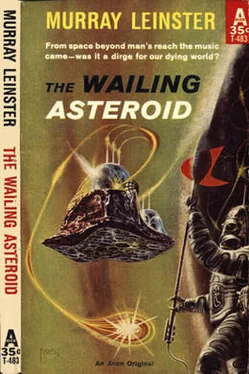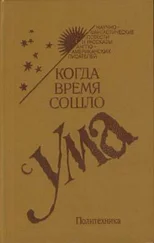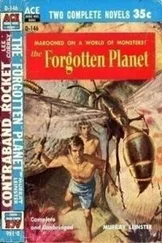He continued with immoderate calm, "I believe the home world of that civilization has two moons in its sky and something off at the horizon that looks like a hill, but isn't."
"But—"
"The garrison left," explained Burke, "because it was abandoned. It was left behind to stand off the Enemy, and the civilization it belonged to moved away. It was left without supplies, without equipment, without hope. It was left behind even without training to face abandonment, because its members had been trained by black cubes and only knew how to do their own highly special jobs by rote. They were just ordinary soldiers, like the Roman detachments left behind when the legions marched south from Hadrian's Wall and sailed for Gaul. So when there was nothing left for them to do but leave their post or starve—because they couldn't follow the civilization that had abandoned them—they left. The cube in the box was a message they set up for their former rulers and fellow–citizens if they ever returned. It's not a pretty message!"
Sandy swallowed.
"Where'd they go? What happened to them?"
"They went to Earth," said Burke tonelessly. "By twos and fives and dozens, in the service ships that came out with meat, and took back passengers. The service ships had been assigned to bring out what meat the hunting–parties could kill. They took back men who were fighters and ready to face mammoths or sabre tooth tigers or anything else. Just the same, they left a transmitter to call them back if the Enemy ever came again. But it didn't come in their lifetimes, and their descendants forgot. But the transmitter remembered. It called to them. And—we were the ones to answer!"
Sandy hesitated a moment.
"But if the garrison went to Earth," she said dubiously, "what became of them? There aren't any traces—"
"We're traces," said Burke. "They were our ancestors of ten or twenty thousand years ago. They couldn't build a civilization. They were fighting men! Could the Romans left behind at Hadrian's Wall keep up the culture of Rome? Of course not! The garrison went to Earth and turned savage, and their children's children's children built up a new civilization. And for here and for now, we're it. We've got to face the Enemy and drive him back."
He stopped, and said in a tone that was almost completely steady and held no hint of despair, "It's going to be quite a job. But it's an emergency. We've got to manage it somehow."
There was also an emergency on Earth, not simplified as in space by having somebody like Burke accept the burden of meeting it. The emergency stemmed from the fact that despite the best efforts of the air arm of the United States, Burke and the others had gotten out to space. They'd reached the asteroid M–387. Naturally. The United States thereupon took credit for this most creditable achievement. Inevitably. And it was instantly and frantically denounced for suspected space–imperialism, space–monopoly, and intended space–exploitation.
But when Keller's painstaking instructions for the building of gravity–field detectors reached Earth, these suspicions seemed less plausible. The United States passed on the instructions. The basic principle was so new that nobody could claim it, but it was so simple that many men felt a wholesome shame that they had not thought of it before. Nobody could question a natural law which was so obvious once it was stated. And the building of the device required next to no time at all.
Within days then, where the asteroid had a single ten–foot instrument, the United States had a ten–foot, a thirty–foot and a sixty–foot gravity–field detector available to qualified researchers. The new instruments gave data such as no astronomer had ever hoped for before. The thirty–foot disk, tuned for short range, pictured every gravitational field in the solar system. A previously unguessed–at Saturnian moon, hidden in the outer ring, turned up. All the asteroids could be located at one instant. The mystery of the inadequate mass of Pluto was solved within hours of turning on the thirty–foot device.
When the sixty–foot instrument went on, scaled to take in half a hundred light–years of space, the solar system was a dot on it. But four dark stars, one with planets, and twenty–odd planetary systems were mapped within a day. On that same day, though, a query went back to Keller. What, said the query, was the meaning of certain crawling, bright–red specks in mathematically exact relationship to each other, which were visibly in motion and much closer to Earth than Alpha Centaurus? Alpha Centaurus had always been considered the closest of all stars to Earth. Under magnification the bright–red sparks wove and interwove their paths as if about a common center of gravity. If such a thing were not impossible, it would be guessed that they were suns so close together as to revolve about one another within hours. Even more preposterously, they moved through space at a rate which was a multiple of the speed of light. Thirty light–speeds, of course, could not be. And the direction of their motion seemed to be directly toward the glowings which represented the solar system containing Earth. All this was plainly absurd. But what was the cause of this erroneous report from the new device?
Keller wrote out very neatly, " The instrument here shows the same phenomenon. Its appearance much farther away triggered the transmitter here to send the first signals to Earth. Data suggests red dots represent artificial gravity–fields strong enough to warp space and produce new spatial constants including higher speed for light, hence possible higher speed for spacecraft carrying artificial gravity generators. Request evaluation this possibility. "
Pam coded it and sent it to Earth. And presently, on Earth, astronomers looked at each other helplessly. Because Keller had stated the only possible explanation. Objects like real suns, if so close together, would tear each other to bits and fuse in flaming novas. Moreover, the pattern of motion of the red–spark–producing objects could not have come into being of itself. It was artificial. There was a group of Things in motion toward Earth's solar system. They would arrive within so many days. They were millions of miles apart, but their gravity–fields were so strong that they orbited each other within hours. If they had gravity–fields, they had mass, which could be as artificial as their gravity. And, whirling about each other in the maddest of dances, ten suns passing through the human solar system could leave nothing but debris behind them.
Oddly enough, the ships that made those gravity–fields might be so small as to be beyond the power of a telescope to detect at a few thousand miles. The destruction of all the solar planets and the sun itself might be accomplished by motes. They would not need to use power for destruction. Gravitation is not expended any more than magnetism, when something is attracted by it. The artificial gravity–fields would only need to be built up. They had been. Once created, they could exist forever without need for added power, just as the sun and planets do not expend power for their mutual attraction, and as the Earth parts with no energy to keep its moon a captive.
The newspapers did not publish this news. But, very quietly, every civilized government on Earth got instructions for the making of a gravity–field detector. Most had them built. And then for the first time in human history there was an actual and desperately honest attempt to poll all human knowledge and all human resources for a common human end. For once, no eminent figure assumed the undignified pose involved in standing on one's dignity. For once, the public remained unworried and undisturbed while the heads of states aged visibly.
Naturally some of the people in the secret frantically demanded that the five in the fortress solve the problem all the science of Earth could not even attack. Incredible lists of required information items went out to Burke and Keller and Holmes. Keller read the lists calmly and tried to answer the questions that seemed to make sense. Holmes doggedly spent all his time experiencing cubes in the hope that by sheer accident he might come upon something useful. Pam, scowling, coded and decoded without pause. And Sandy looked anxiously at Burke.
Читать дальше







